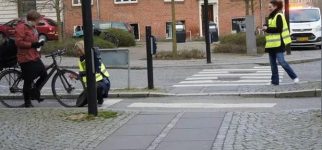
Willful! Denmark RFID tags on bicycle wheels can make traffic lights automatically turn green
[ad_1]
Cycling in Denmark can be said to be refreshing. Copenhagen literally pointed out in an analysis that the benefits of bicycles to people are unmatched by cars. And now, if you live in Aarhus, Denmark’s second largest city, congratulations, you can still have the “privilege” to change the color of the traffic lights willfully.

Aarhus is experimenting with a bicycle-first road system
Aarhus is experimenting with this bicycle-first road system. As long as a radio frequency identification (RFID) tag is attached to the bicycle wheel, when passing an intersection, the tag will send a signal to the neighboring reader, and the traffic light will automatically turn green. In this way, cyclists don’t have to wait and can pass smoothly; but those driving at the other end of the intersection have to step on the brakes first.

When passing an intersection, the labels attached to the wheels will send signals to the neighboring readers, and the traffic lights will automatically turn green.
“We want to provide convenience for the cyclists in Aarhus, so that more and more people choose to travel by bicycle, and reduce the number of cars in the city. This way, it is a good way to let cyclists exclusively use the lanes. On the contrary, if you drive, you will not That’s convenient,” said project member Louise Overgaard.
The principle of the combination of this RFID tag and reader is actually not unfamiliar to us. It is similar to a road induction coil. As long as the coil senses that a vehicle is passing by, it will send a signal to change the color of the traffic light (domestic road induction coils are mostly used to record vehicle Violation).
But this is the first time to give priority to bicycles. In many cases, if we want to ride our bicycles all the way unimpeded, theoretically we have to break traffic laws and run red lights.

At present, Aarhus has only installed a reader at a medium-sized intersection in the city, and 200 cyclists enjoy unblocked benefits.
For the time being, Aarhus has only installed a reader at a medium-sized intersection in the city, and only 200 cyclists have installed radio frequency identification tags on their cars, so they can enjoy unblocked benefits. But Overgaard said that if the project results are good, it will consider expanding the scope of application.
“The possibility of covering the whole city is unlikely, but there are many people who ride bicycles in the central city. We want to reduce the number of vehicles and allow more people to ride bicycles.”
 “The possibility of covering the whole city is unlikely, but there are many people who ride bicycles in the inner city. We want to reduce the number of vehicles and allow more people to ride bicycles.
“The possibility of covering the whole city is unlikely, but there are many people who ride bicycles in the inner city. We want to reduce the number of vehicles and allow more people to ride bicycles.
This new road system was designed by ID-Advice, a radio frequency identification technology company. Company member Rita Westergaard said that the installation of tags and identifiers is very simple, and there is no need to dig out road burying equipment like road induction coils, and the cost is only 60% of the latter. So even if you want to apply this technology in other regions, it won’t take too much effort.
Driving a private car in Denmark doesn’t seem to be a windy thing at all, but it’s a bit pitiful!
[ad_2]



